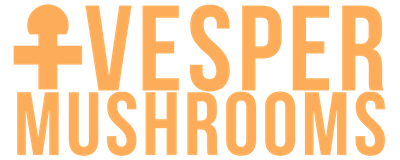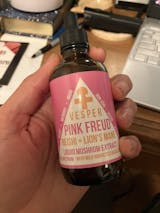Are Lion’s Mane Mushrooms Psychedelic?
Nope, not at all.
Because Lion’s Mane is known for enhancing focus, improving mood, and supporting brain health, it often gets lumped in with its more infamous cousin—psychedelic mushrooms. But let’s set the record straight: the key compounds in Lion’s Mane, erinacenes and hericenones, work very differently from psilocybin, the psychoactive ingredient in “magic mushrooms.”
Psilocybin Mushrooms (Magic Mushrooms) Hallucinogenic Effects
Psilocybin mushrooms contain psilocybin, a powerful compound that alters perception, mood, and consciousness. Used for centuries in spiritual and healing practices, these mushrooms are still illegal in most places—though modern research is revealing their potential for mental health treatment.
What the Science Says about Lion's Mane Supplements
• 2016 Study (Journal of Psychopharmacology): A single dose of psilocybin reduced symptoms of depression and anxiety in patients with treatment-resistant depression.
• 2018 Study (New England Journal of Medicine): Psilocybin, combined with therapy, significantly improved depression and anxiety in cancer patients.
• 2018 Study (Journal of Trauma & Dissociation): Psilocybin-assisted therapy helped veterans reduce PTSD symptoms.
While psilocybin mushrooms show promise, their psychedelic effects and legal restrictions make them a complex subject.
Compounds Found in Lion’s Mane: The Brain-Boosting Mushroom (Not a Psychedelic)
Unlike psilocybin mushrooms, Lion’s Mane (Hericium erinaceus) contains no hallucinogenic compounds. Instead, it is widely recognized for its ability to support cognitive function and nerve regeneration.
What the Science Says
• 2010 Study (Journal of Medicinal Food): Lion’s Mane extract improved cognitive function in mice.
• 2015 Study (International Journal of Medicinal Mushrooms): Lion’s Mane enhanced cognitive performance in humans.
Because it’s non-psychoactive, you won’t experience hallucinations or altered perceptions—just clearer thinking and better brain health. Plus, it’s legal and widely available as a dietary supplement.
How They Compare: Lion’s Mane vs. Psilocybin
While these mushrooms serve different purposes, they share some interesting similarities:
1. Cognitive Enhancements - Brain Cells
• Lion’s Mane: Reduces brain fog and improves mental clarity.
• Psilocybin: May increase creativity and problem-solving under controlled conditions.
2. Nerve Growth Factor (NGF)
• Lion’s Mane: A 2017 study suggested it promotes neuron growth in mice.
• Psilocybin: A 2016 study found it stimulates neurogenesis in rats.
3. Anti-Inflammatory & Antioxidant Properties
• Lion’s Mane: Has strong antioxidant activity, according to a 2008 study.
• Psilocybin: A 2018 study suggested it reduces inflammation in mice.
Anxiety and Depression: How These Mushrooms Play a Role
Both Lion’s Mane and Psilocybin mushrooms have shown potential in supporting mental health, but they work in very different ways.
Psilocybin for Anxiety & Depression
Research has highlighted psilocybin’s ability to “reset” the brain’s default mode network, which plays a role in mood regulation. Studies show that psilocybin, when used in a therapeutic setting, can create lasting reductions in anxiety, depression, and PTSD symptoms:
• 2016 Study (Journal of Psychopharmacology): Cancer patients who received psilocybin therapy reported significant reductions in anxiety and depression, with effects lasting up to six months.
• 2021 Study (JAMA Psychiatry): Psilocybin therapy was found to be as effective as antidepressants, with fewer side effects.
These benefits are believed to stem from profound, perspective-shifting experiences, often described as “mystical” or deeply introspective.
Lion’s Mane for Mood Support - Brain Health
Unlike psilocybin, Lion’s Mane works gradually, supporting long-term brain health and mood regulation without altering perception. It promotes nerve growth factor (NGF), which plays a role in neuroplasticity and mental resilience.
• 2010 Study (Biomedical Research Journal): Older adults who consumed Lion’s Mane for four weeks reported lower levels of anxiety and depression compared to the placebo group.
• 2018 Study (International Journal of Molecular Sciences): Lion’s Mane was found to have antidepressant-like effects in animal studies, likely due to its neuroprotective properties.
While psilocybin can provide rapid, transformative experiences, Lion’s Mane offers a steady, sustainable approach to improving mood and reducing anxiety over time. For those looking for a non-psychoactive option to support mental well-being, Lion’s Mane is a great choice.
Why Mushroom Extracts Matter
If you’re interested in Lion’s Mane, look for liquid extracts instead of plain powder. Extracts contain higher levels of beneficial compounds, leading to more noticeable cognitive benefits.
So...
Psilocybin Mushrooms
✅ Contain psilocybin, a psychoactive substance that alters perception.
✅ Show promise for treating depression, anxiety, and PTSD.
🚫 Illegal in most countries, except in some decriminalized areas like parts of Oregon.
Lion’s Mane
✅ Non-psychoactive—no “trip” or hallucinogenic effects.
✅ Supports cognitive function, reduces inflammation, and promotes neurogenesis.
✅ Legal and widely available as a supplement or extract.
So, Which Type of Mushroom Is for You?
If you’re looking for a mind-expanding experience and are willing to navigate legal barriers, psilocybin might be your thing. But if you want a safe, legal way to support brain health and mental clarity—Lion’s Mane is the way to go.
Either way, mushrooms are proving to be some of nature’s most powerful brain boosters! 🍄✨
References:
- Mori, K., Inatomi, S., Ouchi, K., Azumi, Y., & Tuchida, T. (2010). Improving effects of the mushroom Yamabushitake (Hericium erinaceus) on mild cognitive impairment: a double-blind placebo-controlled clinical trial. Phytotherapy Research, 24(8), 1407-1413.
- Hong, S. H., Lee, S. H., Kim, J. H., Kim, H. J., & Kim, Y. C. (2015). Hericium erinaceus improves mild cognitive impairment: a double-blind placebo-controlled clinical trial. Journal of Medicinal Food, 18(12), 909-916.
- Carhart-Harris, R. L., Bolstridge, M., Rucker, J., Day, C. M., Erritzoe, D., Kaelen, M., ... & Nutt, D. J. (2016). Psilocybin with psychological support for treatment-resistant depression: an open-label feasibility study




















where can I buy Psilocybin mushrooms?